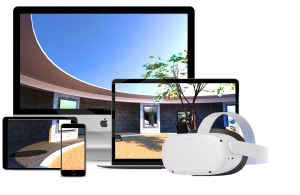Publishing Metaverse Experiences
There are a few ways to give participants access to your experience. Share a web link, invite by email, embed in a HTML webpage or blog or export as SCORM.
World & Space Invites by Email
Embed in a HTML Webpage or Blog
WebObjects and SaaS Delivery inside SCORM
Export as SCORM with Adobe Captivate 2019
Export as SCORM with Storyline 3
Export as Dynamics 365 Sales Dashboard
Share a Web Link
You can simply visit the space, copy the url of the experience and share it with users by chat, in social media posts, anywhere really.
Making it Private
By default worlds and spaces are created as accessible to anyone with the link, these are called Guest users. If you wish only authenticated users to be allowed, in the space Basic Settings set Private to Enabled. This determines whether guest (unauthenticated) access is allowed.
Setting the world or space as Private means only people with an Email Invitation can gain access directly with the link, all others will be denied access.
World & Space Invites by Email
Login to the admin dashboard
Enter the email, name and role of the user (choose Editor role if you want them to be able to edit the space). Click [Send]
The user will receive an invitation email to visit the space.
Export Options
Find the World or Space you wish to export. On its card
- Click the triple dot icon
- Choose Export from the menu
URL
This is the URL of the World or Space.
Note: For worlds if Landing Pages are enabled (default) the URL will be that of the landing page. If Landing Pages are disabled then a direct link to the
Meta Quest Link
Copy the link from the export menu
Paste the link in your desktop browser or share with your audience
Click Open for the device you want to display the experience in
Embed in a HTML Webpage or Blog
Click on the field or the clipboard icon to copy the embed code.
It will be similar to this
<iframe src="https://app.learnbrite.com/scenario_2.16/?spaceId=YOURSPACEID" allow="vr; geolocation; microphone; camera; midi; encrypted-media; autoplay; fullscreen; gyroscope; accelerometer;" id="learnbriteSpaceFrame" width="800" height="600" frameborder="0" scrolling="no" style="border: 0" /> |
Important Note: The hosting webpage must use https with a valid SSL certificate for the experience to work within the iframe.
Using this code in a webpage can produce results like this
Using a QR Code link
Share the QR Code so participants can easily access the space by scanning the code with a mobile device or VR/AR capable headset.
If this World or Space is set as "Private", participants will not be able to access unless they were invited – see World & Space Invites.
Export as SCORM
SCORM zip files can be exported. You can then upload the SCORM zip file to your LMS (Learning Management System) and begin to enroll participants.
WebObjects and SaaS Delivery inside SCORM
If you are familiar with Articulate Storyline or Adobe Captivate you may know about webobjects.
This feature allows you to embed content from the web into your slideshows. For example you can embed a YouTube video on a slide. When your SCORM module is accessed by participants the video appears on the slide and the video content is delivered from YouTube servers (the video is not bundled or saved inside the SCORM zip package as an mp4 video file, it is streamed direct from YouTube).
The Hyperspace Metaverse Platform works in a similar fashion, the 3D engine and content is delivered into the SCORM slide. The 3D content and engine are quickly delivered from the Hyperspace Metaverse Platform global servers to the slide (the content and engine are not bundled or saved inside the SCORM zip package).
Automagic Avatars and SCORM
Participants who access the experience will automatically be assigned a unique non-personally identifiable ID which keeps track of their avatar choice and game state over multiple visits/sessions.
Scores through SCORM
Scores in the experience can easily be exposed to the SCORM, these scores will automatically appear in the LMS (Learning Management System) reports for that SCORM module.
Export as SCORM with Adobe Captivate 2019
Click the [SCORM 1.2 Archive] button to receive a SCORM zip file. You can then upload the SCORM zip file to your LMS (Learning Management System) and begin to enroll participants.
Export as SCORM with Storyline 3
With Articulate Storyline you have two options, download the project file and work with it further in Storyline before publishing as HTML SCORM there or downloading the ready made SCORM zip.
Storyline 3 Project
Click [Project File] to download a .story file in Storyline 3 format. The project contains one slide with the embedded Hyperspace Metaverse Platform experience. Now you can add introductory slides or whatever else you would like, then publish as HTML SCORM and upload to your LMS (Learning Management System).
SCORM Zip FIle
Click the [SCORM 1.2 Archive] button to receive a SCORM zip file. You can then upload the SCORM zip file to your LMS (Learning Management System) and begin to enroll participants.
Embedding in an existing SCORM course
You may have an existing SCORM module you produced in Articulate Storyline, Articulate Rise or Adobe Captivate.
You can add Hyperspace Metaverse Platform experiences to your existing courses by following the guides in the Academy
Export as Dynamics 365 Sales Dashboard
Available for Worlds this allows embedding of a metaverse within Dynamics 365 dashboard for staff and prospects to engage. For a more customized deployment see the full Microsoft Dynamics 365 CRM configuration guide here.

